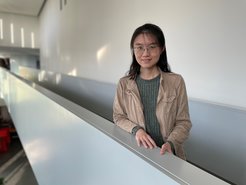"I'm interested in intrinsic reactivity"
Young group leader develops new concepts in physical organic chemistry
Guanqi Qiu is the new group leader at the Max Planck Institut für Kohlenforschung. She is working experimentally as well as theoretically. Currently she is looking for PhD Candidates.

Anyone who talks to Guanqi Qiu about chemistry quickly realizes that the 31-year-old scientist is passionate about her work. The young woman, who studied in Singapore, Great Britain, and completed her doctorate in the United States, has recently started her independent research group at the Max Planck Institut für Kohlenforschung. She will build up a new research program, Fundamental Principles of Organic Reactivity, in the general field of physical organic chemistry. She occupies an uncommon position in terms of research scope and philosophy.
"Yes, we work on theories, but mainly in the conceptual rather than the computational aspects," says Guanqi Qiu and explains: "We are interested in developing new principles of organic reactivity and catalysis, both experimentally and computationally." Specifically, Qiu is particularly interested in what chemists call intrinsic reactivity. "It's about the inherent nature of a family of reactions independent of the thermodynamic driving forces," explains Qiu. In the field of organic catalysis research, the role of this aspect has not been explicitly explored. She wants to change this, which will be initiated by experiments, boosted by computations, and returned to experiments to substantiate the newly formulated concept. “We need to come back to experiments to extract the understanding of chemical causations from data correlations.” Targeted attempts to systematically modulate intrinsic reactivity are very rare, explains Qiu. "Our research focuses on exploring the basic principles that determine the intrinsic properties of reactions and aims to revolutionize the way we understand and manipulate them."
Already when she was at school in Singapore, she knew that she wanted to become a scientist. "For me, the work of science is similar to that of an artist to a significant extent," she says. “In addition to logical thinking, a lot of imagination is also required to explore the unknown unknowns, and intellectual open-mindedness is crucial. Sure science does provide immediate practical tools, but what’s more rewarding for me is the new ways of thinking that I can contribute, which can potentially redefine longstanding problems.” At the age of 19, she went to study at University of Cambridge in the UK to complete her Bachelor of Natural Sciences. After a research stay in Singapore, she went to Princeton University in the USA for her doctorate with Professor Robert R. Knowles. In 2021, she came to Germany with the help of a Humboldt Fellowship - to Justus Liebig University Giessen to join Professor Peter R. Schreiner's team.
Qiu is now setting up her first independent research group at the Max Planck Institut für Kohlenforschung. She is currently looking for doctoral students who are willing to step out of their scientific comfort zone. "Basic research requires a certain spirit of an explorer," Qiu says. After all, it is about entering and exploring uncharted scientific territory. "And that works wonderfully here at the Max Planck Institute with all its facilities," she emphasizes.


